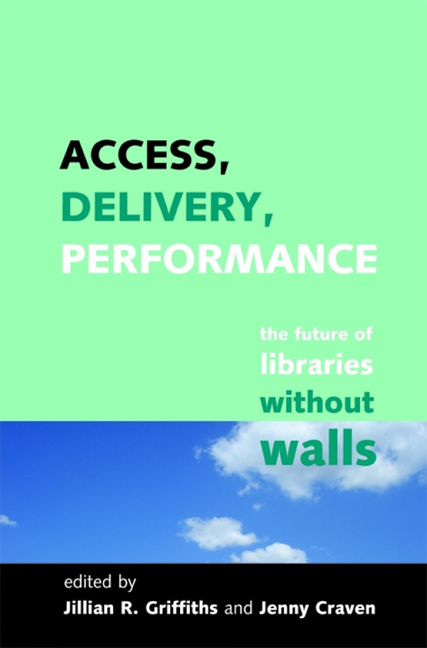Book contents
- Frontmatter
- Contents
- Contributors
- 1 Introduction
- 2 The Library Research Unit at the University of Lancaster, 1967–1972: a memoir
- Theme 1 Libraries, learning and distance learning
- Theme 2 Widening access to information
- Theme 3 Changing directions of information delivery
- Theme 4 Performance, quality and leadership
- 10 An evaluation decision-making system: development and implementation of a web-based evaluation learning and instructional tool
- 11 Measuring the quality of academic library electronic services and resources
- 12 Influential leadership for academic libraries
- Peter Brophy: a selected bibliography
- Index
12 - Influential leadership for academic libraries
from Theme 4 - Performance, quality and leadership
Published online by Cambridge University Press: 08 June 2018
- Frontmatter
- Contents
- Contributors
- 1 Introduction
- 2 The Library Research Unit at the University of Lancaster, 1967–1972: a memoir
- Theme 1 Libraries, learning and distance learning
- Theme 2 Widening access to information
- Theme 3 Changing directions of information delivery
- Theme 4 Performance, quality and leadership
- 10 An evaluation decision-making system: development and implementation of a web-based evaluation learning and instructional tool
- 11 Measuring the quality of academic library electronic services and resources
- 12 Influential leadership for academic libraries
- Peter Brophy: a selected bibliography
- Index
Summary
Introduction
Libraries are at the forefront of the turbulent environment of the digital age. Academic libraries, more specifically, are wrestling with changing student, staff and researcher expectations about access to information resources to support learning, teaching and research. The ‘Google generation’ of students expect fast and straightforward access to information and are intolerant of interfaces that require multiple stages to arrive at the full text of a document. They are not impressed by the need for authentication or barriers imposed by organizational structures and licensing arrangements. Taking this further, Von Hippel (2006) talks about the democratization of innovation in access to information and the shift in power from information providers to users. In addition, and with potentially serious consequences for providing ready access to research information, there are major changes taking place in the scholarly communication processes.
Open access publishing and institutional repositories are vying with more traditional publisher-controlled means of publication in what were print, and are now, e-journals and e-books. Information professionals not only need to respond to changing user expectations and relationships between stakeholders in scholarly publishing, they are also required to work in different partnership models with other academic services and other professional groups, which can take them far beyond the traditional concept of libraries, creating new models of holistic student support, learning environments and teaching and research collaborations. Consequently, the academic information profession has no option but to continuously change. As Mech suggested as long ago as 1996, ‘academic transformation will not be the result of a committee decision. Higher education and academic librarianship are being re-shaped by the actions of professionals and the institutions in which they work. These individuals are not super-heroes. They are ordinary people who decide to exercise leadership’ (345). Unless the information profession is prepared to sell out to the technocrats and to relinquish the very important role of working with communities and organizations to facilitate their access to information in the face of overwhelming complexity and, some might suggest, chaos, the information profession and its members have no choice but to exercise influential leadership.
- Type
- Chapter
- Information
- Access, Delivery, PerformanceThe Future of Libraries Without Walls, pp. 197 - 214Publisher: FacetPrint publication year: 2008

